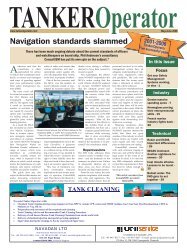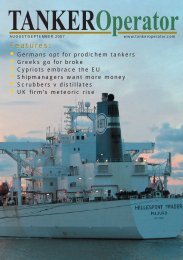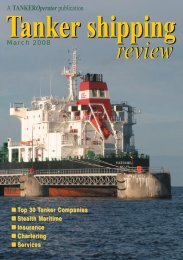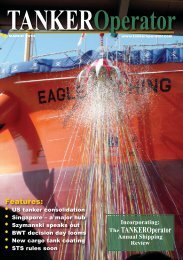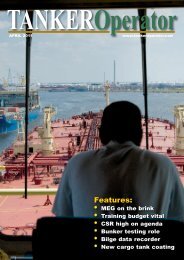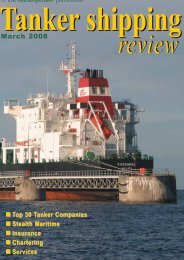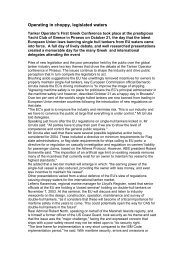Features: Features: - Tanker Operator
Features: Features: - Tanker Operator
Features: Features: - Tanker Operator
You also want an ePaper? Increase the reach of your titles
YUMPU automatically turns print PDFs into web optimized ePapers that Google loves.
INDUSTRY - NEWS<br />
Castrol Marine wins first order for biodegradable lubricants<br />
Castrol Marine has<br />
reached its first<br />
milestone in the roll-out<br />
of the world's first<br />
comprehensive range of<br />
biodegradable marine<br />
lubricant with a major<br />
order to supply Turkish<br />
chemical tanker<br />
operator Chemmariner<br />
Shipping.<br />
David Gilmour, BP-Castrol<br />
marine sales director, said: "We<br />
are delighted to successfully<br />
complete our first customer order<br />
for biodegradable lubricant. As<br />
we begin the roll-out of this new<br />
product range we are extremely<br />
encouraged by the high levels of<br />
enthusiasm that bio oil has<br />
generated among our customers.<br />
"There are likely to be some<br />
serious shifts in the 'green product'<br />
landscape during the next few<br />
years," Gilmour added. "Some of<br />
the coming changes may be<br />
influenced by legislation regarding<br />
the environmental performance of<br />
ships and so-called 'green<br />
incentives', while others will come<br />
about because of consumer<br />
pressure on logistics suppliers to<br />
demonstrate green credentials."<br />
Chemmariner will initially use<br />
Castrol Marine's Biostat 220 stern<br />
tube oil on its fleet of vessels.<br />
Biostat 220 is part of the Castrol<br />
Marine Greendeck range of<br />
biodegradable lubricants launched<br />
in 2007. The hydraulic, stern<br />
tube, gear oils and greases are<br />
claimed to be 100% more<br />
biodegradable than conventional<br />
mineral oils.<br />
The first vessel to take delivery<br />
of the bio oil was the Alfatem, a<br />
6,753 dwt tanker built in 2000,<br />
while at Antwerp. The remainder<br />
of the fleet - the Acacia, Star 1<br />
and Lilac - will switch to Biostat<br />
220 in the near future.<br />
Chemmariner Shipping also<br />
said that it plans to deploy the<br />
full range of biodegradable<br />
products on its entire newbuild<br />
programme. The first<br />
Alfatem is claimed to be the first vessel to use biodegradable lubricants.<br />
newbuilding to carry Castrol<br />
Marine bio products is expected<br />
to be delivered later this year.<br />
In total, five new chemical<br />
tankers are scheduled for delivery<br />
between 2008 and 2010. All of<br />
these vessels' deck hydraulic<br />
systems, gearboxes and stern<br />
tubes will be filled with Castrol<br />
Marine biodegradable oils.<br />
November launch<br />
Castrol Marine launched what it<br />
claimed was the world's first<br />
comprehensive range of<br />
biodegradable marine lubricant<br />
last November.<br />
This new range of<br />
biodegradable hydraulic, stern<br />
tube, gear oils and greases are<br />
100 times less toxic and 100%<br />
more biodegradable than<br />
conventional mineral oils and<br />
exceed the requirements of the<br />
US Environmental Protection<br />
Agency. This cuts the risk of<br />
environmental damage from<br />
accidental leakage, a routine<br />
occurrence in the maritime<br />
industry, particularly among older<br />
vessels, Castrol said.<br />
It is estimated that over 30 mill<br />
gallons of oil is leaked from ships<br />
during normal operations in ports<br />
and harbours every year - more<br />
than three times the Exxon Valdez<br />
oil spill. Machinery failure and<br />
human error are the major<br />
contributing factors. According to<br />
industry data, leakages of five to<br />
1,000 tonnes have dropped<br />
dramatically in the last few years,<br />
but those under five tonnes have<br />
eased only marginally.<br />
Speaking at the launch,<br />
Gilmour said; "This illustrates<br />
how important it is to guard<br />
against the smallest spillages. The<br />
management and control of<br />
marine pollution is steadily<br />
assuming a higher priority for<br />
ship operators as governments<br />
and official bodies focus<br />
increasingly on environmental<br />
infringements and threaten<br />
personnel with criminal<br />
prosecution. However, the<br />
industry should not simply react<br />
to authorities' requirements but<br />
take a proactive approach to<br />
avoid damaging the marine<br />
environment during operations."<br />
Underlying causes of pollution<br />
incidents included failure and<br />
misuse of valves, overflows,<br />
defects in plate and pipes, hose<br />
rupture, contaminated bilges and<br />
faulty gauges. Castrol thought that<br />
the replacement of conventional<br />
mineral oils with biodegradable<br />
lubricant in equipment where there<br />
is a risk of accidental spillage or<br />
leakage and consequent<br />
environmental damage could<br />
eventually become mandatory.<br />
At the same time, Castrol<br />
Marine announced that it had<br />
joined together with Eco Ports,<br />
IMarEST and ProSea to raise the<br />
awareness of the problem of<br />
environmental damage from oil<br />
leaks from ships in ports and<br />
harbours.<br />
Gilmour said; "The aim is to<br />
inform the industry on oil leak<br />
and spillage issues and motivate<br />
the industry to take positive<br />
action to reduce the impact of oil<br />
entering the marine eco system."<br />
The objectives of the campaign<br />
are to make the industry aware of<br />
the operational leakage and<br />
discharge of oil and its effects on<br />
the marine environment and to<br />
think about ways of reducing the<br />
amount of operational leakage<br />
of oil.<br />
"Large oil spills at sea have<br />
got most attention when it comes<br />
to environmental problems with<br />
shipping," Gilmour said. "Beside<br />
the big tanker accidents, there are<br />
other problems that are at least as<br />
serious and we support any<br />
measures to protect the marine<br />
environment.<br />
"The use of biodegradable oils<br />
can reduce the environmental<br />
impact of ship operations, but we<br />
also need to urge the shipping<br />
industry to think about ways they<br />
can help reduce the amount of oil<br />
leaked and spilled when vessels<br />
are in ports. Reducing human<br />
error is absolutely vital if we are<br />
to tackle the problem."<br />
TO<br />
08<br />
TANKER<strong>Operator</strong> March 2008



